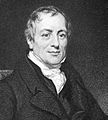Comparative advantage facts for kids
Comparative advantage is a big idea in economics, especially when countries trade with each other. A country has a comparative advantage when it can make a certain good or service at a lower opportunity cost than another country.
Think of opportunity cost as "what you give up." If you choose to spend an hour playing video games, the opportunity cost is the hour you could have spent doing homework or playing outside. In economics, it means what a country gives up making one thing to make another.
Contents
Understanding Comparative Advantage
This idea helps explain why countries trade, even if one country is better at making everything. It's not about being the best at everything (that's called absolute advantage). It's about being relatively better at something, or giving up less to make it.
David Ricardo's Example
A famous economist named David Ricardo used an example with England and Portugal to explain comparative advantage. Imagine both countries made wine and cloth a long time ago.
Here's how many hours it took them to make one unit of each:
| Cloth | Wine | |
|---|---|---|
| England | 100 | 120 |
| Portugal | 90 | 80 |
Who is better at what?
- Portugal could make one unit of cloth in 90 hours.
- England needed 100 hours for one unit of cloth.
- Portugal could make one unit of wine in 80 hours.
- England needed 120 hours for one unit of wine.
As you can see, Portugal was faster at making both cloth and wine. This means Portugal had an absolute advantage in both.
Opportunity Cost in Action
Now, let's look at the opportunity cost for each country:
- For England:
* To make 1 unit of cloth (100 hours), England gives up 100/120 = 5/6 of a unit of wine. * To make 1 unit of wine (120 hours), England gives up 120/100 = 6/5 units of cloth.
- For Portugal:
* To make 1 unit of cloth (90 hours), Portugal gives up 90/80 = 9/8 of a unit of wine. * To make 1 unit of wine (80 hours), Portugal gives up 80/90 = 8/9 of a unit of cloth.
Why England specialized in Cloth
Even though Portugal was faster at both, England's opportunity cost for making cloth (5/6 of a unit of wine) was lower than Portugal's (9/8 of a unit of wine). This means England gave up less wine to make cloth. So, England had a comparative advantage in making cloth.
On the other hand, Portugal's opportunity cost for making wine (8/9 of a unit of cloth) was lower than England's (6/5 units of cloth). So, Portugal had a comparative advantage in making wine.
The Outcome of Trade
David Ricardo predicted that if these countries traded freely, Portugal would focus on making wine, and England would focus on making cloth. This is exactly what happened! Both countries ended up with more cloth and wine overall by specializing and trading.
This theory also suggests that trying to block trade from other countries (called protectionism) usually doesn't work well in the long run. When countries specialize in what they do best and trade, everyone can benefit.
Related pages
Images for kids
See also
 In Spanish: Ventaja comparativa para niños
In Spanish: Ventaja comparativa para niños
 | Lonnie Johnson |
 | Granville Woods |
 | Lewis Howard Latimer |
 | James West |


